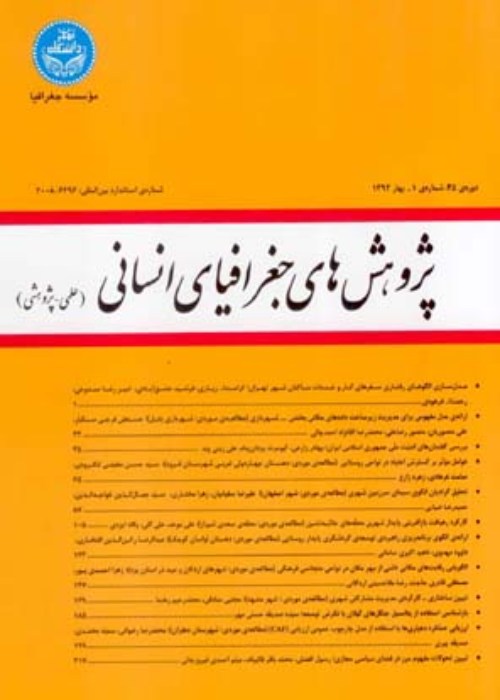External Factors Affecting the Iran-Georgia Relations
Author(s):
Article Type:
Research/Original Article (دارای رتبه معتبر)
Abstract:
The article examines the limits of Iranian foreign policy toward Georgia, outlines the threats from the US and other regional players such as Russia, Turkey and Israeli, and also attempts to identify the main causes and motivations for Tehrans affiliation with Tbilisi. Since regaining its independence two decades ago, Georgia, a small weak state, has developed close relations with Iran in order to compensate for its weaknesses. In contrast, Iran is a mighty regional power, having big role in the Middle East, although, its influence over South Caucasus is smaller and unsteady. The South Caucasus, as a source of both opportunity and threat, occupies a major place in Irans multiregional foreign policy agenda. Besides US factor, this is partly due to the main regional powers in South Caucasus, Russia, Turkey and Israel, creating difficulty for Iran in bolstering its position in relations with Georgia. But Georgia is the only South Caucasian country, which has no border with Iran; and this geographical factor has affected relations between the two countries over more than last two decades.
MethodologyThis paper has been performed as a field and analytical-descriptive study and has also been analyzed by Realism theory in Persian and English resources. The authors of the analysis studies in detail the opportunities for economic and other forms of partnership with Iran, which will help diversify Georgia's neighborhood policy, while balancing the interests of regional players of the South Caucasus. At the end of the research, the possible opportunity for Iran and Georgia that might accompany such a political strategy are discussed as well. The final goal of this document is maximum detection of the potential for improving Georgia-Iran relations and its in-depth analysis, as well as opening a space for discussion and debate on Georgia-Iran relations.
Results and DiscussionGeorgia has had longstanding ties with Iran, regardless of both countries constantly changing political dynamics. But Irans strained relations with the US and several other factors have prevented close cooperation between Iran and Georgia, which is discussed in detail in this article.
One of the most important reasons that hampered the countries relations initially was Georgia`s obvious course toward the West and its impact on Georgia`s decision making. From Iran`s point of view, having close ties with the country who wants more contacts with its enemies, appeared to be a factor that hindered relations. Iran constantly had a fear that the US might have used its power to use Georgia as a bridge-head against Iran. Georgia cancelled a free visa regime with Iran in 2013 due to some pressure from the West. Iran is very prudent when it comes to its relations with Georgia, as far as the Iranian political establishment is not willing to be affected by United States increased influence. This fear is expected to be diminished when Irans relations with Western countries gradually becomes less harsh
And the other hand, from a Russian perspective, improved Iran-Georgian relations will harm the Kremlins strategic interests in south Caucasus, given that the Russian Federation is seeking the absolute hegemonic position in the region and perceives the third partys increased influence in a negative light. Iran is able to become an alternative energy source for Georgia, therefore take credit in decreased energy dependence on Russia. Showing more interest in the region stems from the fact that Turkey, one of the opponents of Iran, increased its influence and potential in the region and Georgia. In parallel with intensification of relations of Georgia with Iran, it is possible for Russia and Turkey to enhance their impact in terms of Soft power, intensifying special services and their impact on certain political processes. The Georgian authorities must be prepared to meet these challenges.
The issue of Israel should be considered in the same context. Israel has a long-standing partnership with Georgia including in the sphere of defense. Officials in Tel Aviv openly criticize the nuclear agreement and believe that Tehran the biggest threat to its statehood. Therefore, it should be taken into account that Georgias interests towards the Jewish state may be sacrificed to Tbilisis close ties with Tehran.
Georgian-Iranian relations to some extent have generally improved since the P5 countries and Iran signed a nuclear agreement in July 2015. For Iran, gaining an influence on the South Caucasus is one of the top foreign priorities so as to settle in the region as the powerful actor. The main obstacle of achieving its intentions is the West`s politics towards Iran, sanctioning its economic activities, halting its growing potential. Intensifying relations with Georgia seemed prolific for Iran in such circumstances. Thus, Iran's main interest in the Georgia could be defined as follows: first, to reduce the influence of outside powers, the US and Turkey, but also Israel, which is viewed as a security threat.
ConclusionIran's foreign policy towards Georgia is essentially a pragmatic one, shaped by realpolitik, historical experiences and balance-of-power calculations. So while Tehran may be eager to assert itself as a regional power, it is able to acknowledge the limitations of its own capacity and the constraint of external challenges by regional players (Russia, Turkey and Israel) and trans-regional powers such as United States. Therefore its regional policy is relatively cautious and balanced. Regional stability and security is of particular importance and have often taken precedence over the ideological preoccupations in Iran´s policy choices in the South Caucasus, inherent to a revolutionary and religious behavior. The JCPOA gives a new chance for establishment of good relations between the two countries. The Georgian side has already started talks on import of natural gas from Iran. Iran views Georgia as a transit country, which could bring its goods to Europe. But there is no doubt that even after JCPOA, US-Iranian hostility and Russia, Turkey and Israel factors still will poison bilateral relations between Tehran and Tbilisi.
MethodologyThis paper has been performed as a field and analytical-descriptive study and has also been analyzed by Realism theory in Persian and English resources. The authors of the analysis studies in detail the opportunities for economic and other forms of partnership with Iran, which will help diversify Georgia's neighborhood policy, while balancing the interests of regional players of the South Caucasus. At the end of the research, the possible opportunity for Iran and Georgia that might accompany such a political strategy are discussed as well. The final goal of this document is maximum detection of the potential for improving Georgia-Iran relations and its in-depth analysis, as well as opening a space for discussion and debate on Georgia-Iran relations.
Results and DiscussionGeorgia has had longstanding ties with Iran, regardless of both countries constantly changing political dynamics. But Irans strained relations with the US and several other factors have prevented close cooperation between Iran and Georgia, which is discussed in detail in this article.
One of the most important reasons that hampered the countries relations initially was Georgia`s obvious course toward the West and its impact on Georgia`s decision making. From Iran`s point of view, having close ties with the country who wants more contacts with its enemies, appeared to be a factor that hindered relations. Iran constantly had a fear that the US might have used its power to use Georgia as a bridge-head against Iran. Georgia cancelled a free visa regime with Iran in 2013 due to some pressure from the West. Iran is very prudent when it comes to its relations with Georgia, as far as the Iranian political establishment is not willing to be affected by United States increased influence. This fear is expected to be diminished when Irans relations with Western countries gradually becomes less harsh
And the other hand, from a Russian perspective, improved Iran-Georgian relations will harm the Kremlins strategic interests in south Caucasus, given that the Russian Federation is seeking the absolute hegemonic position in the region and perceives the third partys increased influence in a negative light. Iran is able to become an alternative energy source for Georgia, therefore take credit in decreased energy dependence on Russia. Showing more interest in the region stems from the fact that Turkey, one of the opponents of Iran, increased its influence and potential in the region and Georgia. In parallel with intensification of relations of Georgia with Iran, it is possible for Russia and Turkey to enhance their impact in terms of Soft power, intensifying special services and their impact on certain political processes. The Georgian authorities must be prepared to meet these challenges.
The issue of Israel should be considered in the same context. Israel has a long-standing partnership with Georgia including in the sphere of defense. Officials in Tel Aviv openly criticize the nuclear agreement and believe that Tehran the biggest threat to its statehood. Therefore, it should be taken into account that Georgias interests towards the Jewish state may be sacrificed to Tbilisis close ties with Tehran.
Georgian-Iranian relations to some extent have generally improved since the P5 countries and Iran signed a nuclear agreement in July 2015. For Iran, gaining an influence on the South Caucasus is one of the top foreign priorities so as to settle in the region as the powerful actor. The main obstacle of achieving its intentions is the West`s politics towards Iran, sanctioning its economic activities, halting its growing potential. Intensifying relations with Georgia seemed prolific for Iran in such circumstances. Thus, Iran's main interest in the Georgia could be defined as follows: first, to reduce the influence of outside powers, the US and Turkey, but also Israel, which is viewed as a security threat.
ConclusionIran's foreign policy towards Georgia is essentially a pragmatic one, shaped by realpolitik, historical experiences and balance-of-power calculations. So while Tehran may be eager to assert itself as a regional power, it is able to acknowledge the limitations of its own capacity and the constraint of external challenges by regional players (Russia, Turkey and Israel) and trans-regional powers such as United States. Therefore its regional policy is relatively cautious and balanced. Regional stability and security is of particular importance and have often taken precedence over the ideological preoccupations in Iran´s policy choices in the South Caucasus, inherent to a revolutionary and religious behavior. The JCPOA gives a new chance for establishment of good relations between the two countries. The Georgian side has already started talks on import of natural gas from Iran. Iran views Georgia as a transit country, which could bring its goods to Europe. But there is no doubt that even after JCPOA, US-Iranian hostility and Russia, Turkey and Israel factors still will poison bilateral relations between Tehran and Tbilisi.
Language:
Persian
Published:
Human Geography Research Quarterly, Volume:49 Issue: 102, 2018
Pages:
935 to 950
magiran.com/p1804093
دانلود و مطالعه متن این مقاله با یکی از روشهای زیر امکان پذیر است:
اشتراک شخصی
با عضویت و پرداخت آنلاین حق اشتراک یکساله به مبلغ 1,390,000ريال میتوانید 70 عنوان مطلب دانلود کنید!
اشتراک سازمانی
به کتابخانه دانشگاه یا محل کار خود پیشنهاد کنید تا اشتراک سازمانی این پایگاه را برای دسترسی نامحدود همه کاربران به متن مطالب تهیه نمایند!
توجه!
- حق عضویت دریافتی صرف حمایت از نشریات عضو و نگهداری، تکمیل و توسعه مگیران میشود.
- پرداخت حق اشتراک و دانلود مقالات اجازه بازنشر آن در سایر رسانههای چاپی و دیجیتال را به کاربر نمیدهد.
In order to view content subscription is required
Personal subscription
Subscribe magiran.com for 70 € euros via PayPal and download 70 articles during a year.
Organization subscription
Please contact us to subscribe your university or library for unlimited access!




